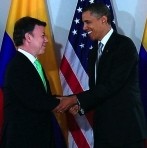BOGOTA -- Government and economic think-tank estimates may differ on the potential economic benefits of the recently approved Colombia-United States Free Trade Agreement, but one of the FTA’s goals has already been achieved: It has allowed the United States to reaffirm support for the Colombian government, still waging a nearly 50-year-long civil war against the FARC guerrilla insurgency and a two-decade battle against drug cartels.
Clyde Prestowitz, president of the Washington-based Economic Strategy Institute, described the trade agreement as “a geopolitical tool in the guise of an economic deal.”
For Tim Stater, an economic counselor at the United States Embassy in Bogotá, the FTA is a smart way for the U.S. to publicly shore up ties with an important partner. “Colombia is very well-positioned [internationally], well-respected, and the Free Trade Agreement is part of that symbolic relationship,” he said.

